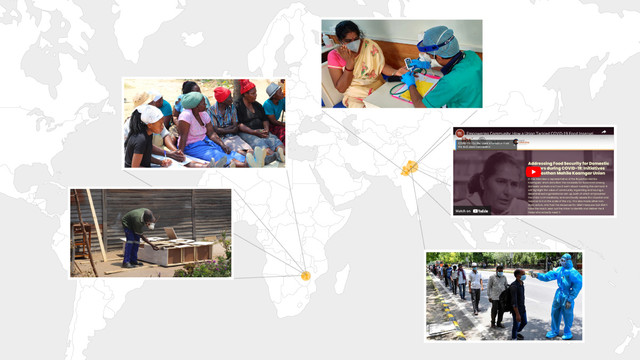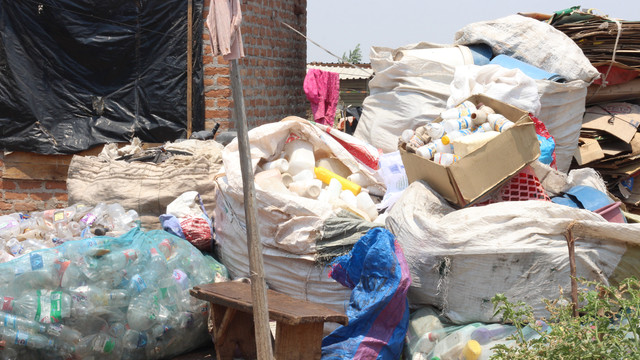Co-learning for inclusive cities
Not so long ago in Zimbabwe, government officials and communities would have blamed each other for the poor state of high density, low-income neighbourhoods. But thanks to years of dialogue the two sides have come together.


Communities and municipal authorities are working more closely together to improve Zimbabwe's low-income neighbourhoods (Photo: Diana Mitlin/IIED)
It is clear that both parties now recognise collective responsibilities, accountabilities and are working towards shared solutions. A meeting I attended in Harare on 17-18 March explored these new relationships. It gathered seven municipal authorities and the organised communities with whom they work.
The community representatives present were all members of the Zimbabwe Homeless People's Federation, whose work is supported by Dialogue on Shelter, a national NGO affiliated to Shack Dwellers International, which also participated in the meeting.
What followed were frank discussions about the challenges involved in improving informal settlements. In joint presentations, municipal staff and federation leaders did not waste time congratulating themselves on work completed but instead focused on current challenges.
Scale matters…
One challenge for communities in areas where services and infrastructure have improved is an influx of new people who can create more overcrowding. A case in point is Epworth, a town just outside of Harare in which a community of 7,000 households has been working with the local authority to develop a plan to secure improvements.
Epworth's Housing Officer Mr Muranduri spoke about the need to work with existing residents to manage the increase in residency following planned improvements to Ward 7. In response, Patience Mudimu, Dialogue on Shelter, challenged the authority to increase the scale of its work and said: "slum upgrading needs to be city wide".
Pace matters too…
In Kariba, when the local authority allocates land to the federation it expects the community to upgrade housing to two-room concrete houses within six months. But William Hwata, federation representative from Kariba, argued that the lowest income households can't meet that deadline.
He suggested this may be becoming less problematic as authorities see the progress residents make — such as planning to improve basic services in the neighbourhood, connecting water and accumulating building materials. Mr Chipepo, the Assistant Housing Director from Kariba City Council, hesitated to agree with this suggestion and emphasised the important of the deadline. But he also acknowledged the value of local residents' work in improving services.
…so does continuity
Since 2010 Kadoma's city council has had three housing directors. Meanwhile the Kadoma federation has been promised land in three different developments, only to have the offers withdrawn and/or the federation being forced away from the development because of the planned level of improvement and associated costs.
The Housing Director of Kadoma Municipality, Mr Hanyane acknowledged the problems that had resulted from the rapid turnover of local government staff, and praised the persistence and quality of the federation's engagement with the authority. He suggested that this is because 80 per cent of the federation's members are women: "I take my hat off to the ladies".
Sharing the benefits
The presentations highlighted the ways in which the impact of the federation is expanding as it includes non-members within activities. In Dzivarasekwa Extension in Harare, for example, the federation families allocated land and relocating into this area simply incorporated the 160 other families on site already into their settlement development. These 480 households now work together to upgrade the area.
In Chinhoyi, non-federation members have benefited from sanitation investments as settlement improvements offer all households the possibility of better access. A group established to improve a communal sanitation block includes members and non-members alike.
Upgrading is possible
The meeting included visits to two of Harare's informal settlements, one which is being comprehensively upgraded and one that has no access to services and is being relocated. More than one official recognised the value of these visits in both pointing out the nature of the problem of informal settlements, and in demonstrating that upgrading is possible and desirable.
What is clear is that the new relationships between communities and city authorities will be critical to that upgrading work and any new urban development options for the lowest income and most disadvantaged urban dwellers.
Bridget Mandizha (Housing Manager in Harare) reflected on what the city had learnt from its own project with the Federation, which is improving access to both services and housing in the settlement of Dzivarasekwa.
She argued that "the project is a de-learning platform for technocrats. It has taken us from the theoretical background of a top bottom approach to the provision of services through the participatory approach. We have been re-taught".
Diana Mitlin is principal researcher in IIED's Human Settlements Group (diana.mitlin@iied.org).



